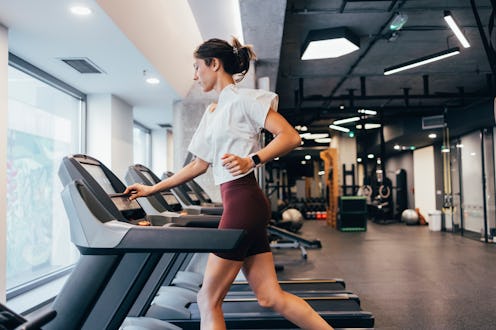Fitness
Is 15 Minutes Of Cardio Enough? Here's What Experts Say
The verdict on mini workouts.

Even if you can’t get enough of your spin bike, it can be tricky to regularly spend a solid 45 minutes to an hour on getting your dose of heart-pumping exercise. And that’s why countless fitness apps (like Peloton and Freeletics) offer mini workouts that do the work in a shorter time period. But is 15 minutes of cardio enough to truly reap the benefits?
The short answer is yes. Generally, you’ll experience benefits to both your fitness game and overall health by doing a 15-minute heart-pumping session. “A rapidly growing body of literature is demonstrating significant health benefits with short duration high-intensity workouts performed on a consistent basis,” says Dr. Robert Parisien, M.D., an orthopedic sports medicine surgeon with Mount Sinai. “These include improved cardiovascular endurance, VO2 max — the maximum amount of oxygen an individual can utilize during intense exercise — caloric burn, mental health with decreased rates of anxiety and depression, as well as a boost in cognitive performance.”
You’ll also reap the standard heart health benefits of a cardio workout. “The most direct benefit you get from 15 minutes of cardio is that it will strengthen your heart,” says Cat Kom, founder of Studio SWEAT onDemand. “Strengthening your heart helps reduce the risk of diseases, improves circulation, and improves your white blood cell activity which is great for your health and immune system.”
That said, experts point out that the type of cardio you’re doing for 15 minutes affects what you get out of the sweat session. Read on to learn more about mini-workouts, including how to get the most out of them.
The Lowdown On Doing 15 Minutes Of Cardio Vs. A Longer Session
According to fitness pros, the most important factor to pay attention to in a shorter cardio-based workout session is intensity. “A 15-minute cardio session can be just as effective as a 30- or 60-minute one if you’re pushing yourself the entire time or doing interval training throughout,” says Sydney Miller, founder of fitness platform HOUSEWORK. When you’re going hard in a workout, regardless of duration, you’re getting your heart rate up high — which is key for reaping the heart health benefits.
That’s why experts recommend turning to more intense workouts when you’re short on time, like HIIT. “HIIT training can improve your heart’s aerobic capacity in a very short amount of time as you’re training your heart rate to come up high and then back down to recovery,” says Miller. Compared to the other type of cardio, LISS (low-intensity steady-state), HIIT gives you more bang for your buck. Other examples include Tabata workouts, boxing, jump rope, running (heavy on the sprinting), and spinning.
“Whereas HIIT would typically be performed as fast as possible for a shortened time frame, LISS is typically slower and longer,” explains Vincent Angeli, director of fitness at UFC Gym in Torrance, California. Think of intervals where you’re going all-out with burpees, squat jumps, jumping jacks, and other plyometric, heart-pumping moves as an example of HIIT: If you’re doing LISS, that’d be something like a long jog or cycling session where your heart rate hovers at around the same level the entire time. “You’ll likely burn more calories doing the HIIT workout and train your body's strength and coordination in a way the low-intensity session wouldn’t match,” says Angeli. Longer steady-state workouts, on the other hand, are working more of your endurance base, says Denise Chakoian, fitness expert and founder of Core Cycle Fitness Lagree.
It really all depends on what your fitness goals are. One thing to note? The special perk of doing a more intense shorter workout is you may perform better than you would in a longer sesh. “I find that in a longer cardio session, it’s harder to maintain the same heart rate output as in a shorter workout, so sometimes shorter can be more effective,” says Miller. When you’re maintaining a steady heart rate throughout a workout, you’re typically focusing on a moderate intensity for an extended period of time, which boosts your endurance and aerobic capacity.
For the best results, consistency is key. “Short-duration cardio workouts are most impactful when performed on a consistent basis,” says Parisien, who suggests doing them about three to four times a week.
Overall, the pros say getting any amount of cardio will do your body good. “I’m a firm believer that there is no ‘best’ workout — it’s all about what you look forward to and enjoy because that’s what’s going to keep you motivated to keep going,” says Miller. If you have 15 minutes, you’ll be devoting that time to moving your body and getting your heart rate up — resulting in a mood and health boost. As Angeli says, “For every active minute, you’re burning calories, improving bodily function, and improving your health.”
Studies referenced:
Campbell, J. (2018). Debunking the Myth of Exercise-Induced Immune Suppression: Redefining the Impact of Exercise on Immunological Health Across the Lifespan. Frontiers in Immunology. https://www.ncbi.nlm.nih.gov/pmc/articles/PMC5911985/
Foster, C. (2015). The Effects of High Intensity Interval Training vs Steady State Training on Aerobic and Anaerobic Capacity. Journal of Sports Science & Medicine. https://www.ncbi.nlm.nih.gov/pmc/articles/PMC4657417/
Ito, S. (2019). High-intensity interval training for health benefits and care of cardiac diseases - The key to an efficient exercise protocol. World Journal of Cardiology. https://www.ncbi.nlm.nih.gov/pmc/articles/PMC6763680/
Pinckard, K. (2019). Effects of Exercise to Improve Cardiovascular Health. Frontiers in Cardiovascular Medicine. https://www.ncbi.nlm.nih.gov/pmc/articles/PMC6557987/
Schmidt. W.D. (2001). Effects of long versus short bout exercise on fitness and weight loss. J Am Coll Nutr. https://pubmed.ncbi.nlm.nih.gov/11601564/
Experts:
Dr. Robert Parisien, M.D., an orthopedic sports medicine surgeon with Mount Sinai
Cat Kom, founder of Studio SWEAT onDemand
Sydney Miller, founder of fitness platform HOUSEWORK
Vincent Angeli, director of fitness at UFC Gym in Torrance, California
Denise Chakoian, fitness expert and founder of Core Cycle Fitness Lagree